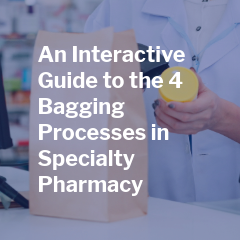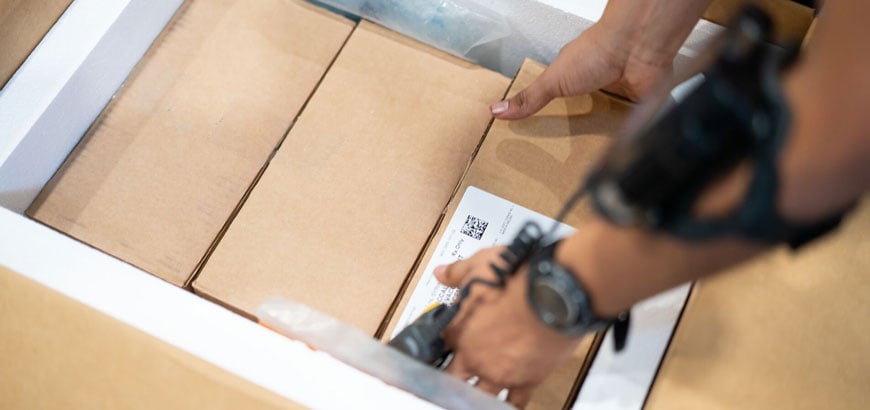
This visual helps illustrate the nuances of each type of bagging in specialty pharmacy and what it may mean for your health system.
Key compliance requirements to meet regulatory deadlines and help your health system achieve more.
By
Date
November 17, 2023

Read time: 5 minutes
By: Scott Mooney
We recently sat down with expert Scott Mooney, VP Distribution Operations at McKesson, to discuss the upcoming DSCSA requirements and what health systems can do to help stay compliant and meet the regulatory deadlines.
Q: What is the Drug Supply Chain Security Act (DSCSA)?
A: The industry has been preparing for the Drug Supply Chain Security Act (DSCSA) implementation - which requires manufacturers, distributors, dispensers, and other stakeholders to implement an enhanced system for the interoperable, electronic tracing of drugs - for the past 10 years, with the legal deadline approaching on November 27, 2023.
The goal of the DSCSA is to prevent the distribution of counterfeit or contaminated drugs, which can pose significant risks to patient health. According to the FDA1, the enhanced system will:
On Friday, August 25, 2023, the U.S. Food and Drug Administration (FDA) announced through a compliance policy that it would not take action to enforce the Enhanced Drug Distribution Security requirements of the Drug Supply Chain Security Act (DSCSA), section 582(g)(1) of the Federal Food, Drug, and Cosmetic Act, until November 27, 2024.
The FDA is providing a one-year stabilization period (“Stabilization Period”) beyond the legal deadline of November 27, 2023. This period will allow all key players within the supply chain (manufacturers, distributors, dispensers, and trading partners) to mature processes and refine operations that are required to comply with these specific package-level tracing requirements. The FDA will continue to enforce the other DSCSA requirements during this Stabilization Period.
Q: What are the Key DSCSA Compliance Interoperability Requirements that Health Systems Need to Be Aware of?
A: To meet the DSCSA interoperability requirements, health systems need to assess, plan, and implement processes for product identification, tracing, and verification, as well as product quarantine and investigation and product reporting. This includes:
Q: How will Interoperable Tracing and Verification2 Affect Health Systems and Pharmacies?
A: Beginning in November, transaction information, transaction statement, and transaction history information will only be available electronically. Health systems and pharmacies will need to have a solution in place to receive this information, as well as the ability to provide the transaction information when transferring ownership of a product. Dispensers are also required to capture and maintain all transaction information and transaction statements for six years.
Under DSCSA, all trading partners must have the ability to verify a product upon request from a trading partner, federal agency, or state agency. Health systems need a solution that can capture and store large volumes of serialized product data, as well as a process for matching, retrieving, and exchanging requested product information and issuing a notification to trading partners within the mandated 24-hour response time if the product is determined to be illegitimate.
Q: What is a GLN? How Do I Access my GLN Number?
A: A GLN, or Global Location Number, is a unique identifier that lets businesses know who is involved in transactions and where things are located throughout the supply chain. Establishing and submitting your GLN number(s) is imperative to continue to conduct business throughout the supply chain. GLNs are typically created by the organization that is being identified by subscribing to a license from GS1.
All health systems and clinics must provide two GLN numbers to designate their status:
These numbers may be the same for some businesses if their sold-to and ship-to addresses are identical.
Q: How can Health Systems Stay Ahead of the Requirements?
A: Staying ahead of the requirements will allow your health system the opportunity to identify and remove roadblocks to compliance. To stay on track, look for a distribution partner with proven experience in managing serialization. There are significant advantages to partnering with a supplier that can both handle the product and manage the data in one location. This creates a more streamlined workflow and helps you avoid costly, time-consuming delays.
Q: How can McKesson Help Health Systems Stay DSCSA Compliant?
A: McKesson has the distribution quality controls and the technology to help your health system stay compliant. To aid in the adoption of GLNs for DSCSA purposes, McKesson purchased a group license from GS1. Our cross-functional team is working to collect and enter all customer account data into the GS1 system. If you are a small business with nine locations or less, McKesson may be able to assist you with GLN assignment.
In addition, McKesson is proud to offer customers solutions like ERA and Connect, which not only provides transparency on data, but the ability to gather all your information from a single source.
By complying with the DSCSA, health systems can help to ensure the safety and efficacy of the medications they provide to patients and help prevent the distribution of counterfeit or contaminated drugs.
Ready to learn more? Click here and see how McKesson can help your health system achieve more.
1https://www.fda.gov/drugs/news-events-human-drugs/enhanced-drug-distribution-security-2023-under-dscsa-10052021-10052021
2https://www.fda.gov/drugs/drug-supply-chain-security-act-dscsa/pharmacists-utilize-dscsa-requirements-protect-your-patients